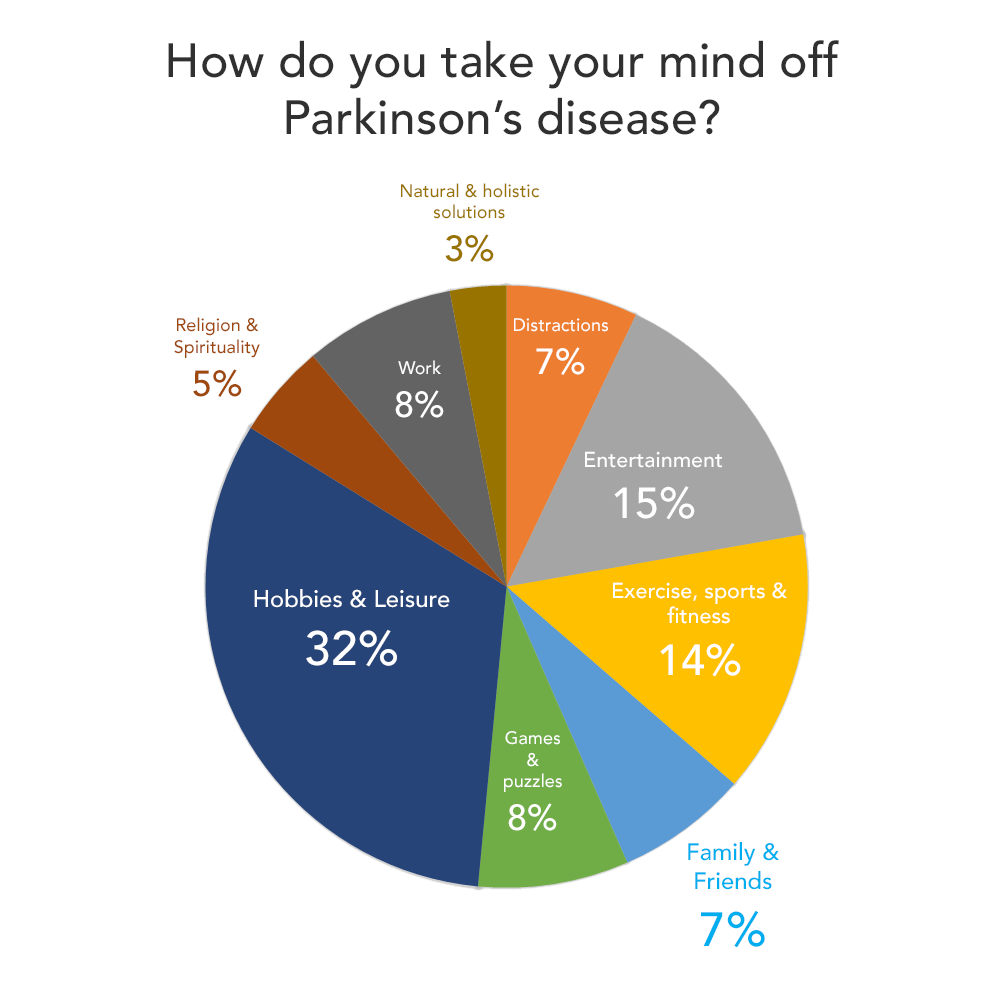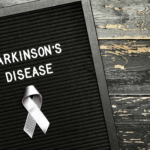One simple question provokes fascinating discussion about ways to handle debilitating neurodegenerative disease.
 PhotoPharmics recently learned the depth and breadth of ways people with Parkinson’s cope with the devastating disease when they asked a large group of them a simple question: What do you do to take your mind off Parkinson’s disease?
PhotoPharmics recently learned the depth and breadth of ways people with Parkinson’s cope with the devastating disease when they asked a large group of them a simple question: What do you do to take your mind off Parkinson’s disease?
There were over 400 responses, and each response was put into one of eight different categories: physical and mental distractions, entertainment, exercise and sports, family and friends, games and puzzles, hobbies and leisure, religion and spirituality, work, and holistic or natural solutions.
The answers were insightful, varied and oftentimes inspiring. They offer a fascinating view of what it could be like inside the world of a unique and fiercely strong group of people. The most popular category was hobbies and leisure, which captured about 28 percent of the responses. Those in this group enjoy things like gardening, painting, writing and sewing.
“I try to keep myself busy,” said Mary Beth Longdon, who pinpointed cooking as a hobby she loves. “I love to cook, although it’s nothing complicated anymore. The pain is worth the pleasure so far.”
One respondent named Lisa said her collections help distract her from Parkinson’s. “I collect antique buttons,” she said. “Sorting them helps me relax.”
Another popular category was exercise. According to the Parkinson’s Foundation, exercise is “a vital component to maintaining balance, mobility and activities of daily living. Exercise and physical activity can improve many PD symptoms.”
51 responses, or 13 percent, mentioned sports and exercise as a way to distract from Parkinson’s disease. Responses included things like golf, boxing, swimming, hiking, stationary bikes and more.
Lauri Ohleger mentioned several ways she stays active: “Ride bikes, hiking, the gym, boxing; staying active in both mind and body!”
Here’s the full breakdown of responses:
- Hobbies and leisure: 32 percent. People listed many different hobbies like gardening, painting and collections.
- Entertainment: 15 percent. Entertainment includes movies, television, music and books.
- Exercise/sports: 14 percent. The third-most popular category for responses.
- Games and puzzles: 8 percent. Things like jigsaw puzzles and card games were popular responses.
- Work: 8 percent. Some people with Parkinson’s found work a pleasant distraction.
- Physical and mental distractions: 7 percent. These responses included things like alcohol and other depressants, as well as scrolling through social media.
- Family and friends: 7 percent. These respondents found comfort being with loved ones.
- Religion/spirituality: 5 percent. Prayers, meditation and ministering were the popular responses in this category.
- Natural/holistic solutions: 3 percent. This category includes things like massage and other natural therapies.
“There’s no question Parkinson’s disease brings many challenges for people,” said Brett Walker, a spokesperson for PhotoPharmics. “And while PhotoPharmics is heavily invested in using phototherapy to treat it, we are also immensely interested in how people with Parkinson’s cope with their disease on a daily basis. Gathering information like this, however informal, gives us a glimpse into the lives of a group of people about whom we care a great deal.”
The neurodegenerative disease manifests itself in dozens of different ways, including physical (or motor) symptoms, like stiffness, rigidity and an involuntary tremor; and non-motor symptoms, like depression, delusions and anxiety.
But the resiliency and determination of people with Parkinson’s cannot be understated. These courageous men and women, “warriors” as they like to call themselves, face their condition every day and choose to fight.
Perhaps their attitude can best be summed-up by one respondent who simply said, “I get busy and dare Parkinson’s to keep up.”
About PhotoPharmics
PhotoPharmics is a privately held, clinical-stage medical device company developing next-generation treatments for treating neurodegenerative disorders through the eyes. Company founders have 30+ years of research and experience in this field. They previously developed specialized light solutions now widely used to regulate circadian rhythms in seasonal affective disorder, sleep disorders, anxiety, and depression (acquired by Philips-Respironics in 2007).
Drawing from research and recent trials, PhotoPharmics is developing applications of specialized light across several neurodegenerative diseases. The company aims to make a clinically meaningful difference in patients’ lives by delivering safe and effective non-invasive treatments. Investor inquiries are welcomed. Learn more at www.photopharmics.com.





